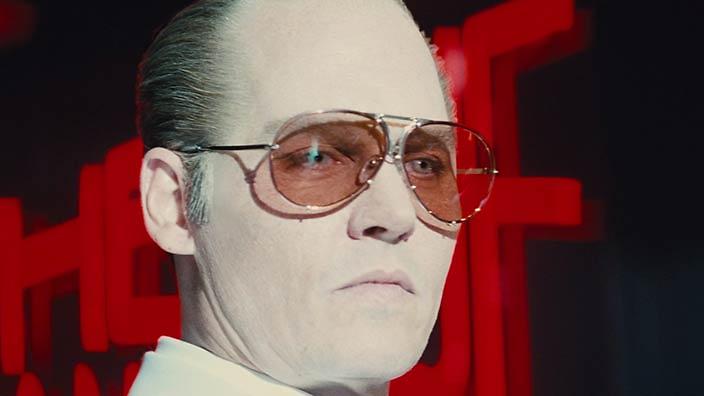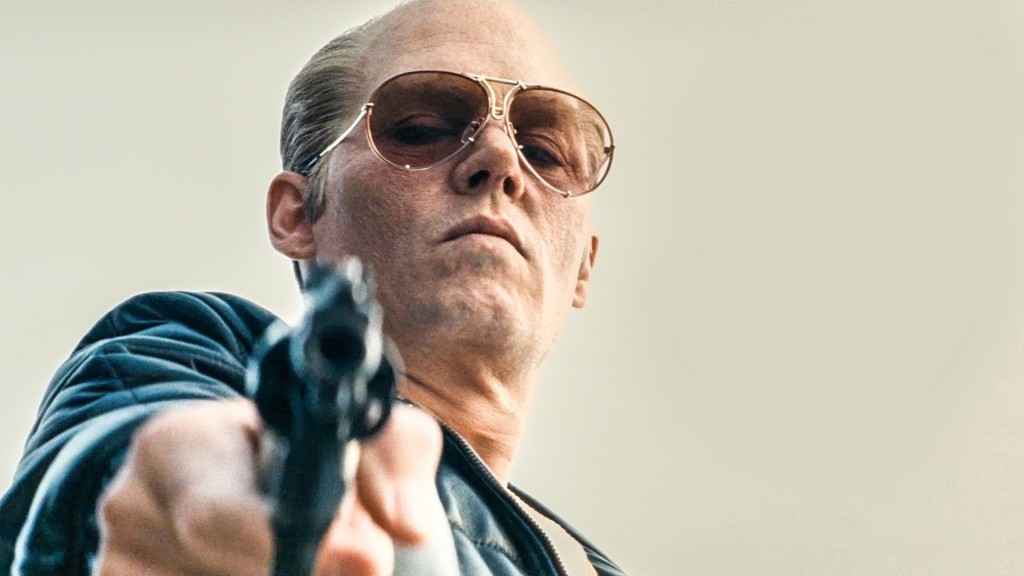Black Mass (2015)
CAST: Johnny Depp, Joel Edgerton, Benedict Cumberbatch, Dakota Johnson, Kevin Bacon, Jesse Plemons, Rory Cochrane, David Harbour, Peter Sarsgaard, Corey Stoll
REVIEW:
Black Mass, a docudrama of the unholy alliance between FBI agents and 1970s-1990s crime lord Whitey Bulger, has a feel of “Scorsese-lite” (Jack Nicholson’s mob boss in Scorsese’s The Departed was loosely modeled after Bulger). Solid acting and some memorable individual scenes enliven a straightforward gangster crime drama that’s otherwise serviceable but generic. Black Mass is reasonably engaging, but nothing groundbreaking, and there’s a sense of a rushed and underdeveloped storyline. Among the many gangland flicks to come out over the years, it’s not a bad installment, but also not a classic. A chilling lead performance by Johnny Depp is likely to linger longer in the memory than the pedestrian narrative.
While the filmmakers elect to use the “present day” testimony of former Bulger associates against their boss as an unnecessary framing device, for the most part this is a relatively straightforward chronicle of events spanning 1975 to 1995. When we begin in the 1970s, Jimmy “Whitey” Bulger (Johnny Depp) is the leader of a small-time South Boston Irish gang that has clout on its own turf but is still considered small potatoes. Bulger’s volatile temper and violent tendencies make him a target of his larger, more powerful competition, the Italian Mafia. But hotshot up-and-coming FBI Agent John Connolly (Joel Edgerton), a South Boston native who was childhood friends with the Bulgers, reaches out to Whitey’s brother, Massachusetts Senator Billy Bulger (Benedict Cumberbatch) to relay a message. Connolly wants to offer a bargain: if Whitey will turn informant for the FBI, and get them actionable intelligence against the Mafia, Connolly will ensure the FBI leaves Bulger and his associates alone. Connolly’s colleagues and superiors (led by Kevin Bacon) are dubious of doing business with the likes of Bulger, but when he feeds them intel that helps them take down the Boston Mafia, they grudgingly turn a blind eye to Bulger’s own activities, with only two stipulations: “no drugs, and no murder”. Unfortunately, these are two more rules than Bulger is willing to follow. The unholy alliance between Bulger and the FBI allows Bulger to get his main competition out of the way and fill the power vacuum himself, flooding Boston’s streets with crime and drugs and expanding his business interests to Miami and Tulsa (where he orders the murder of a prominent businessman), and shipping heavy weapons to Ireland to supply the IRA. Somewhere along the way, his FBI “handler” Connolly crosses the line (if he ever recognized it in the first place) to treating Bulger as a friend more than informant, and is drawn in over his head aiding and abetting Bulger’s crimes. Eventually, the house of cards starts to tumble when Bulger’s brazen criminal activities get too big for Connolly to sweep under the rug, and a new aggressive District Attorney (Corey Stoll) comes to town and sets his sights on Bulger as Public Enemy Number One. The coming downfall will drag down not only Bulger himself, but the FBI agents in bed with him.
While Black Mass is a straightforward docudrama of events surrounding Whitey Bulger from 1975 to 1995, Scott Cooper frames the narrative as a series of extended chronological flashbacks bookended and interspersed with snippets of Bulger’s former associates testifying against him. Partly because of this, and partly because of a feel of myriad underdeveloped subplots, the narrative has a rushed, fragmented feel that gives the sense of skimming through and scratching the surface. Some plot elements, such as Bulger’s business trip to Florida and the plot to assassinate a powerful businessman, are difficult to follow, and some supporting characters are hard to keep straight. The movie’s portrayal of Bulger gives us glimpses of a soft side; he loves his mother, dotes on his young son, and is nice to old ladies in the neighborhood, but like some of the most memorable screen gangsters, he’s unpredictable and unstable, and can turn on a dime from seemingly affable to abrupt bursts of savage violence. Those around Bulger, even those within his inner circle, must tread carefully, lest his hair-trigger wrath turn on them next. The movie tries to spend some character-building time developing the characters’ interpersonal relationships, but as with other half-baked aspects of the narrative, they don’t feel fully formed. Bulger’s relationship with Lindsey (Dakota Johnson), his significantly younger girlfriend and the mother of his son, is dropped after a few early scenes. Likewise underdeveloped is the complex and conflicted relationship between Whitey and his strait-laced Senator brother Billy (Benedict Cumberbatch), who regards his sibling with a mixture of concern and leeriness of associating too closely. The movie tries to divide its central focus between Bulger and Connolly, but despite scenes at home with his wife (Julianne Nicholson), Connolly’s motives remain murky. A childhood friend of the Bulger brothers, now a hotshot and ambitious FBI agent, it stays a bit ambiguous whether Connolly is motivated by a sense of loyalty to Whitey, a self-serving desire for career advancement, or a combination, but it’s clear that, whatever his original intentions, at some point he gets in too deep and crosses the line, socializing with Bulger and actively stonewalling any FBI attempts to investigate him (Connolly was eventually implicated in the murder of several witnesses whose identities he leaked to Bulger). The movie spins its wheels for a while, the fragmented opening scenes taking us a while to get our bearings, but as the noose begins to tighten around Bulger and Connolly, the tension builds to sometimes uncomfortable levels. Along the way, the sometimes dry docudrama tone is enlivened by sometimes jarring bursts of brutal violence. The viciousness and brutality of Whitey and his associates is non-glamorized, and the violence here is Scorsese-esque in its blunt presentation. But as jarring as the violence can occasionally be, Depp’s Bulger is never more chilling than in two non-violent scenes, one an unnerving dinner where his mood turns on a dime from affable to menacing and back again, and another where he pays an unwelcome visit to Connolly’s wife. These moments simmer with the tension of what could happen, even if nothing ultimately does.
 After so many years of becoming associated with Captain Jack Sparrow and other fatuous semi-comedic roles, Black Mass provides a forceful reminder that Johnny Depp is capable of dramatic performances, and Whitey Bulger is probably the darkest character he has ever played, one of the most vicious and ice-blooded crime kingpins since Christopher Walken in At Close Range (in fact, there is one scene, with Depp cavorting in a nightclub while a hit is carried out on his orders, that recalls a similar scene in that film). Despite somewhat overdone makeup that makes him look like a vampire, Depp’s dead-eyed Bulger can take a worthy place among the most menacing of screen gangsters. The moment where he sleazily caresses Connolly’s intimidated wife in her bedroom may make some viewers’ skin crawl as much as her character’s is doing onscreen. Ironically, the last time Depp played a role this completely straight may have been as another notorious real-life gangster, John Dillinger in 2009’s Public Enemies, but while Dillinger fancied himself a gentleman bandit and was portrayed at least semi-sympathetically, there is little sympathetic about Depp’s Bulger. Despite some small soft spots for his mother and his young son, Bulger overall is a vile, sleazy, sinister figure who’s more evil than the anti-heroes we’re used to seeing gangsters portrayed as in movies where they’re the lead characters. There is nothing glamorous or romanticized about Depp’s Bulger, and while some viewers undoubtedly rooted for Dillinger, it’s hard to imagine many people rooting for Depp here.
After so many years of becoming associated with Captain Jack Sparrow and other fatuous semi-comedic roles, Black Mass provides a forceful reminder that Johnny Depp is capable of dramatic performances, and Whitey Bulger is probably the darkest character he has ever played, one of the most vicious and ice-blooded crime kingpins since Christopher Walken in At Close Range (in fact, there is one scene, with Depp cavorting in a nightclub while a hit is carried out on his orders, that recalls a similar scene in that film). Despite somewhat overdone makeup that makes him look like a vampire, Depp’s dead-eyed Bulger can take a worthy place among the most menacing of screen gangsters. The moment where he sleazily caresses Connolly’s intimidated wife in her bedroom may make some viewers’ skin crawl as much as her character’s is doing onscreen. Ironically, the last time Depp played a role this completely straight may have been as another notorious real-life gangster, John Dillinger in 2009’s Public Enemies, but while Dillinger fancied himself a gentleman bandit and was portrayed at least semi-sympathetically, there is little sympathetic about Depp’s Bulger. Despite some small soft spots for his mother and his young son, Bulger overall is a vile, sleazy, sinister figure who’s more evil than the anti-heroes we’re used to seeing gangsters portrayed as in movies where they’re the lead characters. There is nothing glamorous or romanticized about Depp’s Bulger, and while some viewers undoubtedly rooted for Dillinger, it’s hard to imagine many people rooting for Depp here.
Black Mass is Depp’s show first and foremost. The only other character given more than cursory attention is John Connolly, but while Joel Edgerton’s performance is adequate, it’s a bit bland, and he never gets out from under Depp’s shadow. The rest of the cast is fine in thinly-developed roles, including Dakota Johnson (appearing in a more “respectable” film than last year’s 50 Shades of Gray), Benedict Cumberbatch, Kevin Bacon, David Harbour, and Corey Stoll. Peter Sarsgaard has a weird bit part as a cocaine-addled associate of Bulger who gets the bad idea of turning FBI informant, and there are other supporting roles for Rory Cochrane, Juno Temple, Bill Camp, Jeremy Strong, Adam Scott, and Breaking Bad‘s Jesse Plemons.
Black Mass is not the next great American gangster film, but fans of the genre or those interested in the specific subject matter may find things to appreciate, and it’s nice to see Johnny Depp set aside his usual shtick and make a return to serious acting in a role this dark and unpleasant. Depp’s performance and the subject matter should find Black Mass an audience, even if it won’t go down as a gangster classic.
* * 1/2
